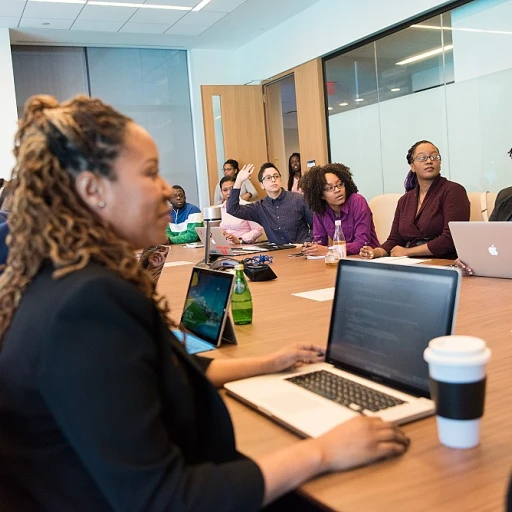
Bridging Communication Gaps in Diverse NZ Workforces
Mastering Multicultural Communication in NZ Offices
New Zealand's workplaces are melting pots of ethnicity, language, and perspective—heralding both opportunity and challenge for office managers. In this environment, bridging communication gaps is imperative for office productivity and employee engagement. Studies indicate that effective communication in diverse workforces can lead to a 25% increase in employee performance (McKinsey & Company, Diversity Wins).
Implementing a Multilingual Awareness Strategy
In an effort to tackle language barriers head-on, adopting a multilingual awareness strategy can be invaluable. This means not only providing resources in employees' native languages but also encouraging multilingual team members to facilitate as bridges. A statistical insight by Statistics New Zealand showed that upwards of 25% of Aucklanders speak more than one language. Leveraging this linguistic diversity can smooth out communication channels significantly.
Utilizing Collaborative Technology Platforms
Collaboration tools have witnessed unprecedented uptake across the globe, and New Zealand is no exception. Platforms like Slack, Zoom, and Microsoft Teams support real-time translation and transcription, making them essential for modern-day office managers. Not only do they foster inclusivity, but they also enhance transparency and camaraderie among team members of various backgrounds.
Conducting Culturally Sensitive Communication Training
It is crucial to recognize that effective communication transcends language—it's also about understanding cultural contexts. Conducting regular workshops on intercultural communication can empower employees to recognize and respect cultural cues and nuances, which is a step towards a more harmonious and productive workplace. The New Zealand Office of Ethnic Affairs provides guidelines and training for embracing cultural diversity, showcasing the government's commitment to multicultural inclusion.
For more insights on breaking communication barriers and fostering a vibrant corporate culture, read our detailed article at MagicOffice NZ.
Encouraging Employee-Led Cultural Initiatives
Office managers can further enhance communication by encouraging employee-led initiatives. Cultural days, language exchange lunches, or international potlucks not only promote cultural understanding but also boost morale. These simple yet effective gatherings enable team members to share their heritage and traditions, thereby building stronger inter-employee relationships.
Office management success is closely tied to how well an office manager can foster unity amid diversity. With these strategies, office managers in New Zealand can navigate these waters effectively, ensuring a collaborative, inclusive, and high-performing office environment.
Crafting and Sustaining an Inclusive Corporate Culture
Crafting and Sustaining an Inclusive Corporate Culture
Establishing Core Values that Reflect Inclusion
Building an inclusive corporate culture starts with defining the core values that your organization espouses. As an office manager, your role in fostering these values cannot be overstated. These core values should not only reflect the commitment to diversity but also guide the behavior within the workplace. Engagement surveys and feedback mechanisms can be invaluable in ensuring these values resonate with the workforce, providing a benchmark for behaviors and decision-making that promote a sense of belonging and respect.
Developing Diversity and Inclusion Initiatives
Diversity and inclusion initiatives are more than just buzzwords in today's corporate environment. They represent actionable plans that can transform the workspace. NZ office managers have a crucial part to play in developing these initiatives. From organizing diversity training workshops to celebrating cultural events, these strategies can help break down barriers and encourage understanding and empathy among employees. It's essential to track participation and feedback to assess the effectiveness of these initiatives and make necessary adjustments.
Leveraging Leadership for Cultural Advocacy
Leadership plays a pivotal role in setting the tone for corporate culture. As an office manager, influencing your leadership team to actively advocate for and participate in cultural initiatives can have a significant impact on overall company morale. It's about promoting active listening, open communication, and demonstrating inclusivity in day-to-day actions. When leadership exemplifies these behaviors, it sends a powerful message to all employees and helps in embedding these practices into the company's fabric.
Empowering Employee Resource Groups
Employee Resource Groups (ERGs) are voluntary, employee-led groups that serve as a resource for both the members and the organization. Office managers can support the formation and growth of ERGs which represent various demographics and interests, offering a platform for employees to voice their unique perspectives and contribute to the workplace's diversity narrative. Empowering these groups leads to innovative ideas and strategies that can enhance the inclusivity of the corporate culture.
Measuring Success: Metrics for Culture Development
An inclusive culture is not built overnight – it requires ongoing effort and measurement. Office managers should establish metrics that provide insight into the health of the corporate culture. These could include employee retention rates, satisfaction scores, or the success of inclusive hiring practices. By keeping a pulse on these indicators, NZ office managers can make data-driven decisions to continually foster a workplace environment where diversity is not just accepted but celebrated.
By delving into the details and demonstrating a personal commitment to diversity and inclusion, you're not just adhering to best practices in office management. You're contributing to a thriving, dynamic, and united workplace reflective of the vibrant diversity found in New Zealand's society.










